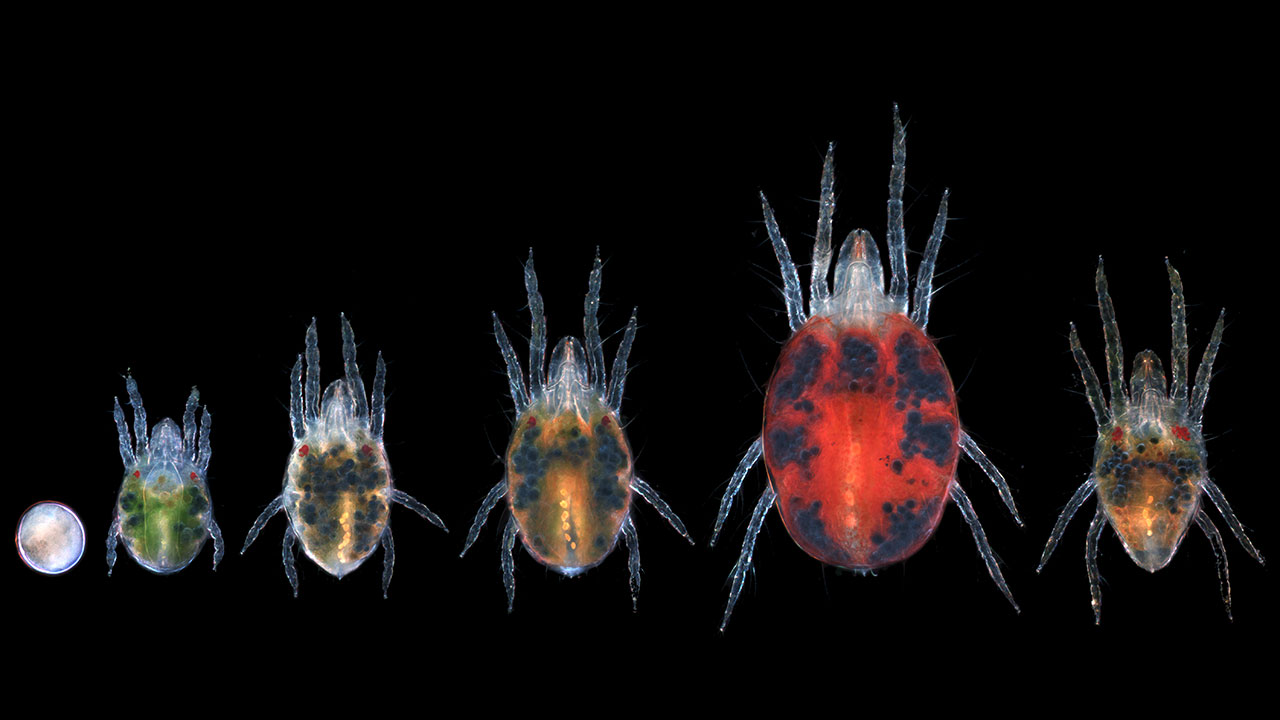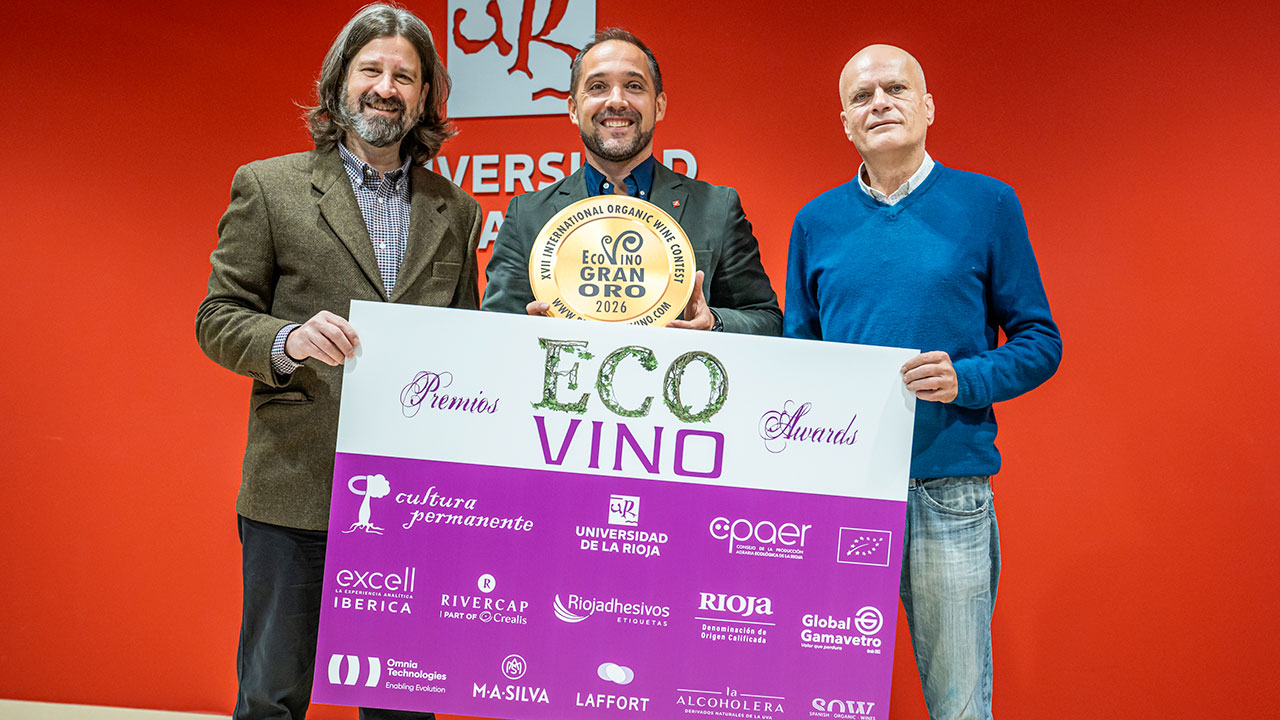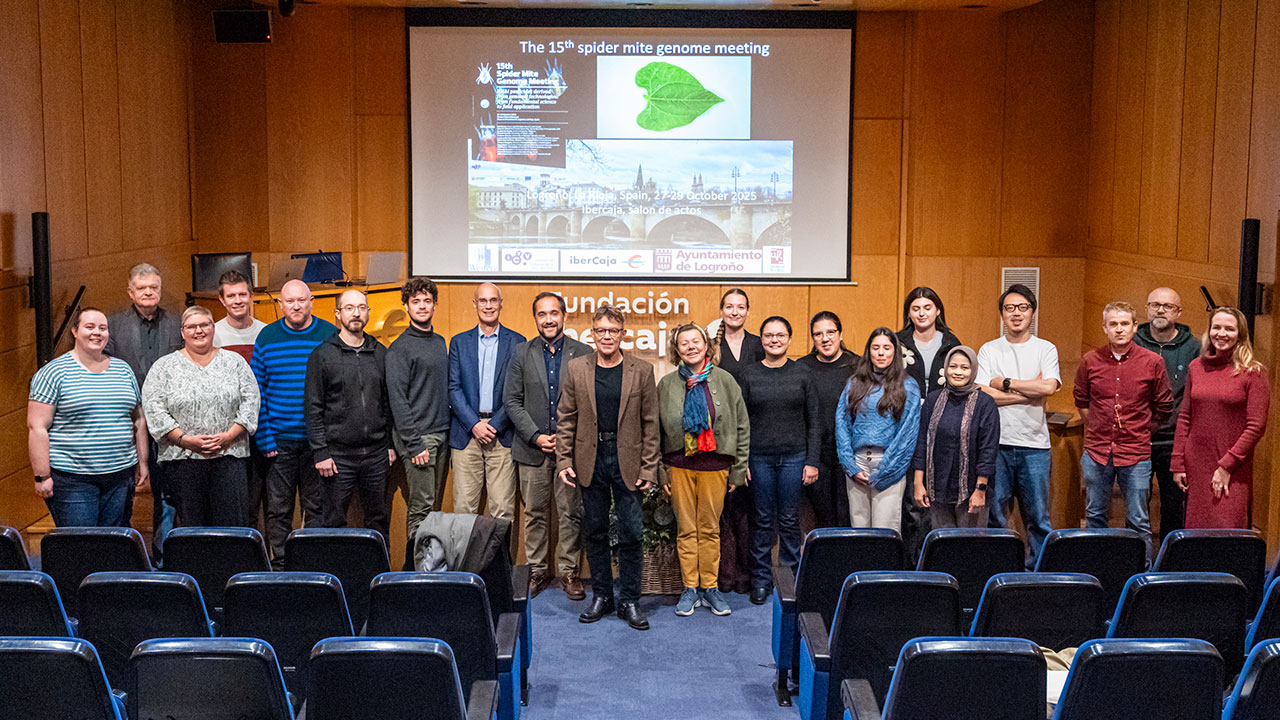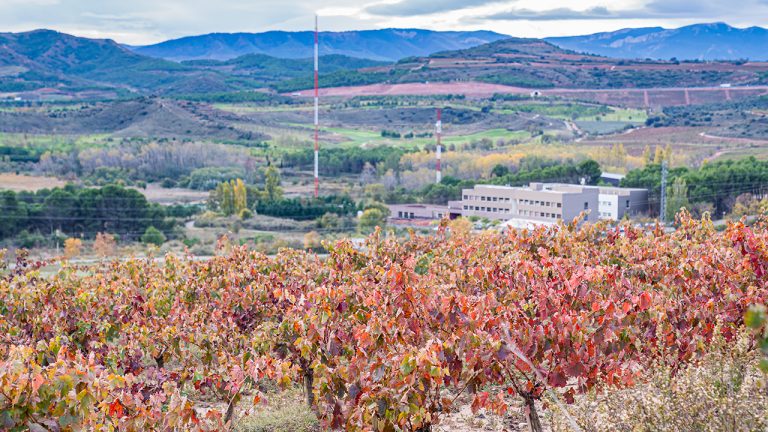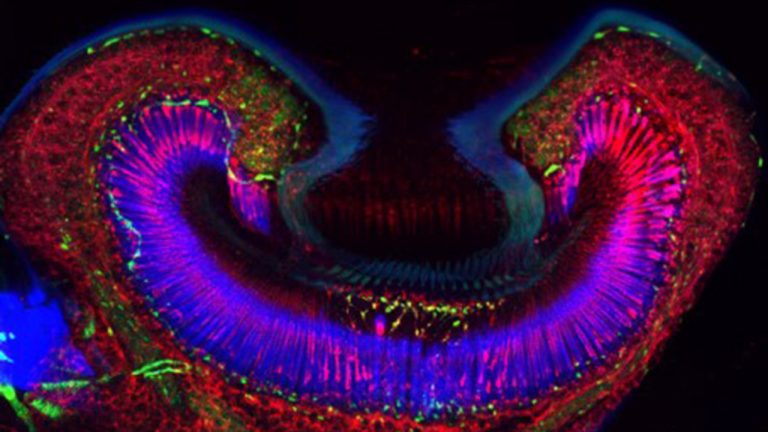Descripción
Investigadores de diez países compartirán en la ‘15ª Reunión Internacional sobre el Genoma de la Araña Roja’ sus avances contra esta temible plaga agrícola, entre ellos los buenos resultados obtenidos en ensayos de campo con acaricidas basados en RNAi.
El encuentro, cuyo lema de este año es ‘De genoma a control de plagas sostenible y ecológico”, está organizado por Miodrag Grbic, profesor visitante de la Universidad de la Rioja y del Instituto de Ciencias de la Vid y el Vino (ICVV).
Las sesiones se retransmitirán online por Zoom:
Para quién
Estudiantes, doctorandos e investigadores interesados.
Entrada libre.
Se expondrán avances fundamentales para el desarrollo de una nueva generación de plaguicidas ecológicos contra ácaros y otras enfermedades de los cultivos, como el oídio o la botrytis.
Programa
Lunes, 27 de octubre de 2025
10:00 horas
Opening speech
Dr. Eduardo Fonseca
Vice-rector of Research
University of La Rioja
10:05 horas
15 years of Spider Mite genome consortium
Miodrag Grbic
University of Western Ontario
10:20 horas
Talk 1: RNA Interference in Agriculture: Sustainable Solutions for Next Generation Acaricides
Grupo de investigadores de USA, Canadá y España.
11:00 horas
Talk 2: RNAi in mites, an overview
Vojislava Grbic
The University of Western Ontario
11:45 horas
Coffee break/press meeting
12:00 horas
Talk 3: An update on route of exposure of dsRNA solution against spider mites
Grupo de investigadores de Canadá y España.
12:20 horas
Talk 4: dsRNA Trigger Format Strongly Affects the Effectiveness of RNAi
Grupo de investigadores de USA y Canadá.
12:40 horas
Talk 5: Development of an early detection model for oidium by satellite and drone imagery
Grupo de investigadores de España.
13:00-15:00 horas
Lunch
15:00 horas
Talk 6: DNA Repair Pathways in the Two-Spotted Spider Mite Tetranychus urticae: Enhancing Homology-Directed Repair
Grupo de investigadores de Bélgica.
15:30 horas
Talk 7: Proteomic evidence for carotenoid and lipid metabolism associated with photoperiodic induction of diapause in the two-spotted spider mite, Tetranychus urticae Koch
Grupo de investigadores de Japón e Indonesia.
16:00 horas
Talk 8: Diversification of degenerin/epithelial Na+ channels (ENaCs) in spider mites
Grupo de investigadores de USA.
16:30 horas
Talk 9: Dual roles of salivary proteins in feeding and silk fiber coating in the spider mite Tetranychus urticae
Grupo de investigadores de Japón.
17:20 horas
Conference dinner&wine tasting: Bodega Valentin Pasqual, Cenicero
Martes, 28 de octubre de 2025
9:30 horas
Salivary Sabotage of Direct and Indirect Plant Defenses
Gary W. Felton
University Park, Pennsylvania, USA.
10:00 horas
Talk 1: How Plants Reprogram Protein Translation in Response to Tetranychus urticae Herbivory under Climate Warming
Grupo de investigadores de España.
10:30 horas
Talk 2: Seed Priming: the plant strikes back
Grupo de investigadores de España.
11:00 horas
Talk 3: Uncovering the complexity of Arabidopsis thaliana defenses against Tetranychus urticae herbivory
Grupo de investigadores de Canadá y USA.
11:30 horas
Coffee break
12:00 horas
Talk 4: From Roots to Neighbors: Mycorrhizal Modulation of Plant Resistance to Tetranychus urticae
Grupo de investigadores de España.
12:30 horas
Talk 5: Genomic basis of adaptation to oscillating environment in a common crop pest, Aceria tosichella
Grupo de investigadores de Polonia.
13:00-15:00 horas
Lunch break
15:00 horas
Talk 6: The Cap’n’collar pathway in the two spotted spider mite Tetranychus urticae and its role in transcriptional regulation of detoxification gene expression
Grupo de investigadores de Bélgica y USA.
15.30 horas
Talk 7: Multiple Detoxification Mechanisms in Tetranychus urticae Enable Metabolic Resistance to the Arabidopsis-Derived Indole-3-Acetonitrile
Grupo de investigadores de Canadá y USA.
16:00 horas
Talk 8: Experimental evolution reveals physiological and ecological costs of plant defence suppression in herbivores
Grupo de investigadores de Portugal y Francia.
16:30 horas
Talk 9: Tomato responses to independently derived tomato-adapted spider mite populations
Grupo de investigadores de Canadá.
17:00 horas
Talk 10: Targeting Cyanide Detoxifying Enzyme to Control Major Agricultural Pest Tetranychus urticae
Grupo de investigadores de
17:30 horas
Talk 11: Glutathione S-Transferases Mediate Two-Spotted Spider Mite Adaptation to Arabidopsis
Grupo de investigadores de USA y Canadá.
18:00 horas
Talk 12: The role of intradiol ring-cleavage dioxygenases in Tetranychus urticae adaptation to Arabidopsis thaliana
Grupo de investigadores de USA y Canadá.
Miércoles, 29 de octubre de 2025
9:30 horas
Talk 1: Old Game, New Players: The Biology and Damage Patterns of Emerging Spider Mite Species in Southwestern Ontario
Grupo de investigadores de Canadá.
10:00 horas
Talk 2: A new spider mite species (Acari: Tetranychidae) in Canada: A contribution to the Tetranychus taxonomy
Grupo de investigadores de Canadá, Serbia, Francia y Canadá.
10:30 horas
Talk 3: Acaricide Resistance in Spider Mites from Ontario Crops: Screening Insights and Emerging Challenges
Grupo de investigadores de Canadá.
11:00 horas
Talk 4: Abamectin Resistance in Spider Mite Populations: Monitoring and Predicting
Grupo de investigadores de Canadá.
Coffee break
11:30 horas
Talk 5: Understanding the mechanisms of macrocyclic lactone resistance in the sheep scab mite, Psoroptes ovis
Grupo de investigadores de Reino Unido.
12:00 horas
Talk 6: Development of qPCR assay as a diagnostic tool to determine etoxazole resistance in two-spotted spider mite populations
Grupo de investigadores de Canadá.
12:30 horas
Talk 7: Occurrence of Tetranychus urticae on rice seedlings: development, oviposition and feeding preference
Grupo de investigadores de Brasil.
13:00 horas
Talk 8: The Spatial Expression Patterns of Cathepsin B- and L-like Cysteine Proteases in the Two Spotted Spider Mite, Tetranychus urticae Koch
Grupo de investigadores de Canadá.
13:30 horas
Lunch break
15:00 horas
Discussions
Contacto
Miodrag Grbic
University of Western Ontario
mgrbic@uwo.ca
Organiza
Miodrag Grbic
Profesor visitante de la Universidad de La Rioja y del ICVV
Etiquetas
Categorías
Noticias relacionadas
Los Premios Ecovino alcanzan su decimoséptima edición
Expertos internacionales presentan la nueva generación de plaguicidas sostenibles basados en RNAi
Actividades relacionadas
